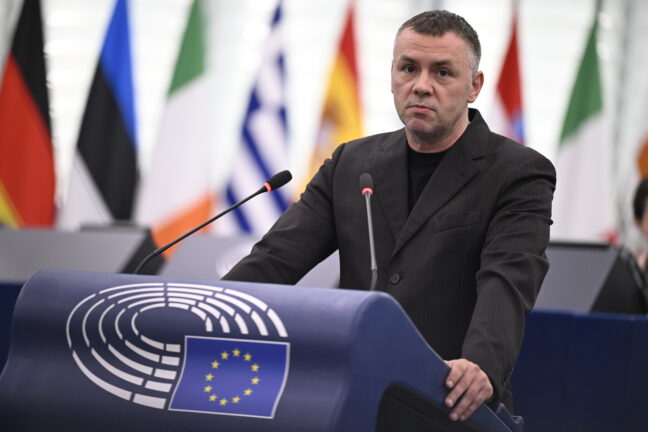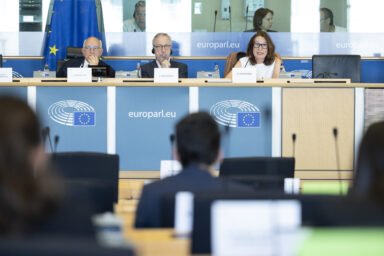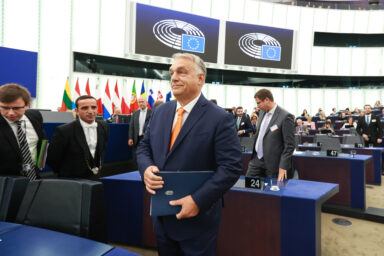As the European Media Freedom Act nears implementation, Parliament debates reveal ideological fault lines, national delays and a troubling lack of public awareness.
One year after the adoption of the European Media Freedom Act (EMFA), and just weeks before it becomes enforceable, the European Parliament convened on Tuesday, 8 June to assess the readiness of member states. The debate revealed uneven progress between member states and even deeper ideological rifts about one of the EU’s most ambitious projects for defending democratic values and press freedom.
Protection, or control?
If there was a ghost in the chamber, it was not one of Brussels bureaucracy; it was George Orwell‘s. Opponents of the EMFA invoked his legacy with theatrical urgency, accusing the EU of erecting a ‘Ministry of Propaganda‘. The session was rife with criticism, not just of the legislation, but of journalism itself. Some MEPs accused the EU of leveraging the EMFA to censor the press, while others targeted journalists directly, charging them with bias and elitism.
You’re trying to create a censorship system. – MEP Csaba Dömötör
“Talking about media freedom in this house means protecting the monopoly of liberal, left-wing opinion,” said MEP Csaba Dömötör from (PfE/HUN). “Brussels institutions only finance liberal media, and contracts are not public. You’re trying to create a censorship system.”
From safeguard to scapegoat
Adopted in 2023, the EMFA was designed to create a unified framework that strengthens editorial independence, prevents state interference, and ensures transparency in media ownership. It also bans the use of spyware against journalists without prior judicial approval. The regulation is set to become fully applicable on 8 August 2025.
The political divide was clear. The centre-left, liberal and green groups framed the EMFA as a cornerstone in the defence of democracy and the rule of law. MEP Hannes Heide, (S&D/AUT) emphasised the urgency: “The EMFA is a milestone for media independence. The Commission must ensure it’s implementation. Media freedom us not negotiable.”
Yet the divide in Parliament was stark. Opposition came sharply from groups like Patriots for Europe (PfE) and the European Sovereignists (ESN), who rejected the EMFA as both intrusive and ideologically biased. Pascale Piera (PfE) called it “a freedom killer,” arguing, “The only regulator of the media should be the readers, not a Brussels-based bureaucracy. This is a Ministry of Propaganda in disguise.”
You might be interested
This is a Ministry of Propaganda in disguise. – MEP Pascale Piera
MEP Gerolf Annemans (PfE/BEL) went further: “This regulation is copied from Orwell. The EU is degenerating into a totalitarian regime.” These far-right voices criticised both the regulation and journalism itself, questioning the latter’s objectivity while claiming it faces rising public scepticism.
Echoing this mistrust, MEP Milan Uhrík (ESN/SVK) lambasted the media itself, accusing mainstream outlets of arrogance and dishonesty: “In Slovakia, 75 per cent of people don’t trust mainstream media because they lie.”
Member states stall
While the political rhetoric in Brussels has reached a boiling point, the situation in member states is arguably more concerning. MEPs from across the political spectrum expressed alarm at the lack of preparedness at the national level and the potential consequences of this inertia.
“In Cyprus, the draft law makes it easier to spy on journalists. Slovakia and Malta, they don’t even know which ministry is responsible. For Hungary, political will is non-existent. In Italy, journalists were spied on,” said Sandro Ruotolo (S&D/ITA). “Many countries, including my own, Poland, are not ready to implement the act,” added Joanna Scheuring-Wielgus (S&D/PLN). “The act becomes applicable in one month, but media freedom has already deteriorated in places like Slovakia,” warned Irena Joveva (Renew/SLO).
This fragmented implementation threatens more than media freedom. By failing to uniformly adopt the EMFA, member states risk creating legal incoherence and market distortion, leading to a two-speed Europe for media protections. Such divergence could also deepen public cynicism about the EU’s ability to enforce the rules it writes.
From regulation to real life
Representing the European Commission, Maria Luís Albuquerque (Financial Services) offered reassurances: “We are in the right place to enforce the newest tools in our toolbox, the EMFA.” Then came a reality check from within the pro-European bloc itself, a comment that cut to the heart of the problem. MEP Hristo Petrov (Renew/BUL) challenged the chamber with a sobering question few in the chamber could answer: “The EMFA was voted here a year ago—how many Europeans even know about it? If we fail to implement it, we’re not just failing journalists. We’re failing democratic accountability.”
The EMFA was voted here a year ago. How many Europeans even know about it? – MEP Hristo Petrov
His remarks point to a deeper disconnect. While political actors debate enforcement mechanisms and regulatory nuance, the public remains largely unaware that such legislation even exists. The media, ironically, has done little to amplify it.
Countdown to credibility
With less than a month until the EMFA takes effect, the stakes are high. As Marie Bjerre, Denmark’s Minister for European Affairs, put it: “A law on paper is not enough, it needs to be implemented. I notice a lot of concern about the legislation, but also a lot of support. Let’s build on that.”
The next four weeks will determine whether the EMFA becomes a real safeguard for media freedom, democratic integrity, and market transparency. The alternative is joining the long list of EU regulations weakened by slow compliance, selective enforcement, and political ambivalence. The clock is ticking, and the EMFA’s credibility depends on what happens not just in Brussels, but in 27 capitals across the continent.











